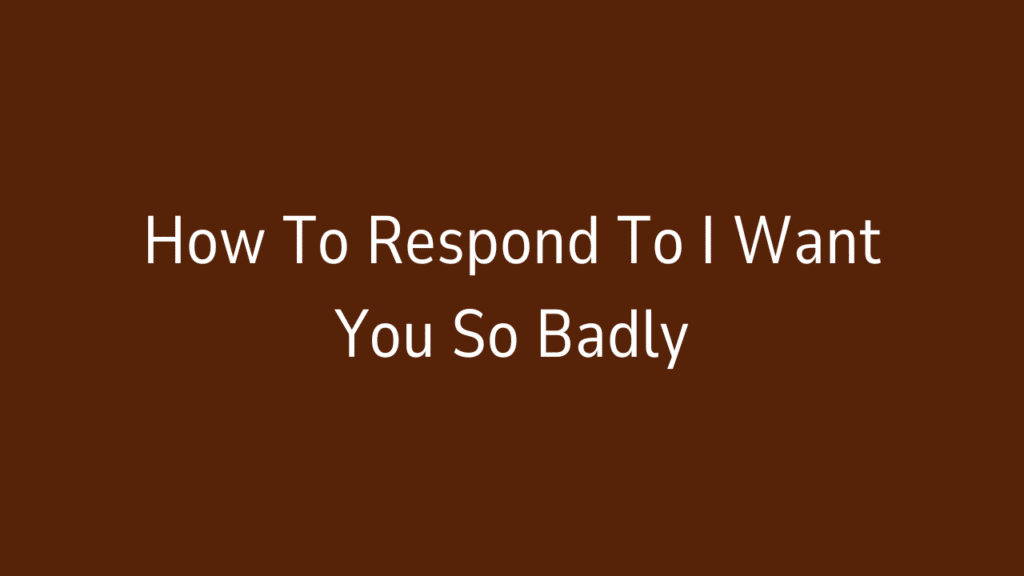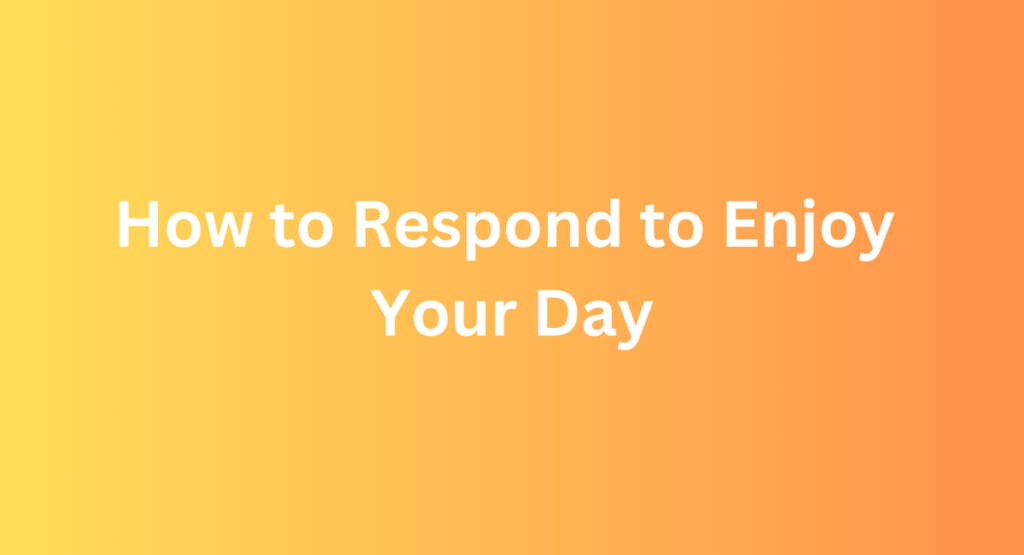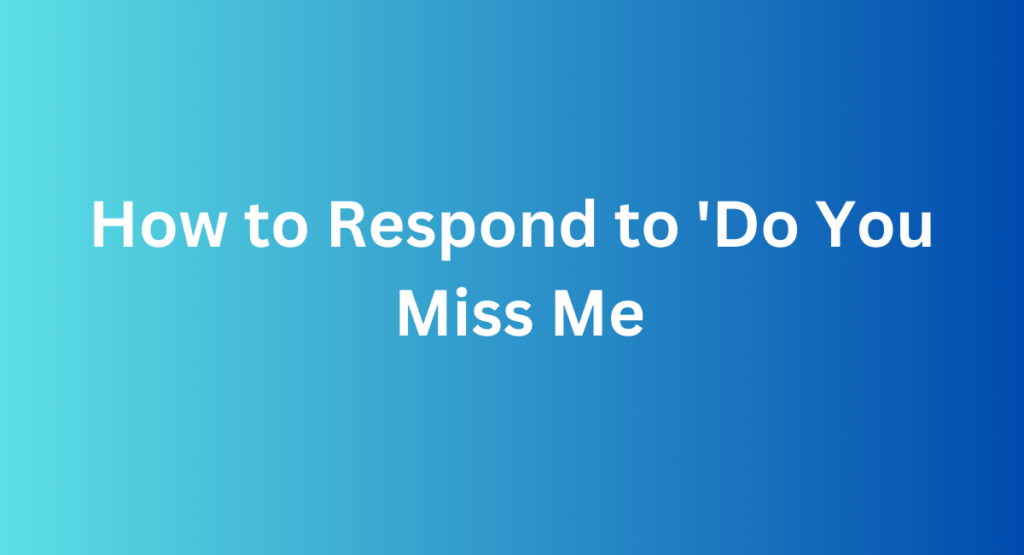Hearing someone say, “I want you so badly,” can evoke a range of emotions depending on the relationship you have with the person and your own feelings. This statement often expresses deep desire, longing, or affection, and how you respond can shape the nature of your relationship moving forward.
In this blog, we’ll explore how to respond to such a vulnerable and bold statement in different contexts, whether romantic, casual, or professional. The key is to handle the situation with clarity, sensitivity, and honesty.
1. What Does “I Want You So Badly” Mean?
This phrase can have different meanings depending on the context:
- Romantic Desire: A declaration of love or emotional attachment.
- Physical Attraction: A sign of strong physical or sexual interest.
- Emotional Vulnerability: An expression of longing to be closer.
- Impulsive Statement: Sometimes said in the heat of the moment without deeper meaning.
Understanding the intent behind the statement is crucial to forming an appropriate response.
2. General Tips for Responding
When someone says, “I want you so badly,” it’s essential to approach the situation with care:
2.1 Stay Calm
Don’t let the intensity of the statement overwhelm you.
2.2 Assess Your Feelings
Consider your feelings toward the person before responding.
2.3 Be Honest
Whether you share their feelings or not, honesty is the best policy.
2.4 Respect Boundaries
Ensure the conversation remains respectful for both parties.
2.5 Clarify Intentions
If the statement is ambiguous, ask for clarification.
3. How to Respond in Different Situations
3.1 When You Feel the Same Way
If you reciprocate their feelings, express your emotions honestly and positively:
- Example 1: “I feel the same way about you. I’ve been wanting to say it for a while.”
- Example 2: “That’s so sweet to hear because I want you too.”
- Example 3: “I’ve been hoping you’d say that. I really care about you.”
3.2 When You’re Unsure of Your Feelings
If you’re uncertain, communicate your need for time to process:
- Example 1: “I wasn’t expecting that. Can I take some time to think about it?”
- Example 2: “That’s a big statement, and I appreciate it. I need some time to figure out my feelings.”
- Example 3: “I care about you, but I’m not sure if I feel the same way yet.”
3.3 When You Don’t Feel the Same Way
Be kind but clear to avoid leading them on:
- Example 1: “I really appreciate your honesty, but I don’t feel the same way.”
- Example 2: “Thank you for sharing that. I see you as a friend, and I want to be honest with you.”
- Example 3: “I value our connection, but I don’t think I can reciprocate those feelings.”
3.4 When the Statement Is Inappropriate
If the context makes the statement uncomfortable or inappropriate, set firm boundaries:
- Example 1: “I’m not comfortable with this conversation. Let’s keep things professional.”
- Example 2: “That’s flattering, but I think we should focus on maintaining boundaries.”
- Example 3: “I respect your feelings, but I don’t think this is the right context for this discussion.”
4. Common Scenarios and Responses
| Scenario | What They Say | Your Response |
|---|---|---|
| Romantic Partner | “I want you so badly.” | “I feel the same way about you. You mean so much to me.” |
| Close Friend | “I want you so badly.” | “I appreciate you being honest, but I see you as a friend.” |
| Professional Setting | “I want you so badly.” | “This isn’t appropriate in our context. Let’s keep things professional.” |
| Casual Acquaintance | “I want you so badly.” | “I wasn’t expecting that. I’m not sure I feel the same way.” |
| Conflicted Feelings | “I want you so badly.” | “Thank you for sharing. I need time to process my feelings.” |
5. Dos and Don’ts When Responding
Dos:
- Stay Calm: Take a moment to collect your thoughts.
- Be Honest: Express your true feelings, whether they’re mutual or not.
- Show Kindness: Handle their vulnerability with care.
- Respect Boundaries: Ensure the conversation remains appropriate.
- Clarify If Needed: Ask for clarification if the statement is unclear.
Don’ts:
- Mock Their Feelings: Avoid making light of their vulnerability.
- React Emotionally: Keep your response composed.
- Mislead Them: Don’t pretend to feel something you don’t.
- Ignore the Statement: Acknowledge their words instead of brushing them off.
- Pressure Them: Avoid pushing for explanations or justifications.
6. FAQs About Responding to “I Want You So Badly”
Q1: What if I feel overwhelmed by their statement?
Take a moment to breathe and respond calmly. It’s okay to ask for time to think:
- “That’s a lot to take in. Can I have some time to process this?”
Q2: How do I respond if I’m in a relationship with someone else?
Be honest about your situation and set clear boundaries:
- “I’m flattered, but I’m in a committed relationship, and I can’t reciprocate those feelings.”
Q3: What if I’m unsure of their intentions?
Ask for clarification to understand their meaning better:
- “Can you explain what you mean by that? I want to make sure I understand.”
Q4: How do I respond without hurting their feelings?
Focus on kindness and clarity:
- “I really value you as a person, but I don’t share the same feelings romantically.”
Q5: Is it okay to feel flattered but not reciprocate?
Yes, it’s natural to feel flattered by someone’s admiration. Be kind but truthful about your feelings.
7. Conclusion
Responding to “I want you so badly” can feel challenging, but the key is to handle the situation with empathy, honesty, and respect. Whether you share their feelings, are unsure, or don’t feel the same way, your response can help maintain mutual respect and understanding.
By staying calm, expressing your feelings honestly, and respecting boundaries, you can navigate this vulnerable moment thoughtfully and gracefully.
How would you respond to someone saying, “I want you so badly”? Share your thoughts or experiences in the comments below!



